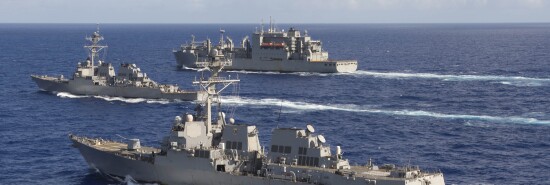
Why few nations are actively supporting the Red Sea security initiative
Tom Rogan
The U.S. has established an initiative to secure international shipping through the Red Sea. The Red Sea is a key international transit route for goods and services coming to Europe from Asia and vice versa. Ten percent of total global trade flows through these waters and the Suez Canal.
The initiative, “Operation Prosperity Guardian,” aims to deter and defeat escalating attacks on shipping by Houthi rebels based in Yemen. A secondary focus falls on deterring attacks by Somali pirates. Four to six U.S. destroyers are now supporting this mission both separately from and as part of the Eisenhower carrier strike group and its other escorts. A Spanish frigate Victoria, the British air defense destroyer HMS Diamond, and the French frigate Languedoc are also supporting the initiative.
DECLINING SITUATION AT SOUTHERN BORDER UPS ANTE ON SENATE IMMIGRATION TALKS
The other participants: Bahrain, Canada, Italy, the Netherlands, Norway, and the Seychelles? It’s unlikely they will provide warships even though Italy, the Netherlands, and Norway could do so. Still, they are at least supporting the initiative. Many others are not.
Take Germany, for example. German exports through the Red Sea accrue more than $150 billion for its economy each year. Why isn’t Germany supporting this security operation? Why isn’t Belgium? Why isn’t Turkey? Why, for that matter, isn’t China? All these nations derive significant national benefit from stable trade flows through the Red Sea. All of them have navies capable of complementing the restoration of Red Sea security. All of them can recognize this initiative is purely defensive in nature.
So why aren’t they supporting a common goal?
In the case of the Europeans, it’s because, put simply, deploying warships costs money — money that they’d rather spend on generous social welfare budgets. And because, even nearly two years after Russia invaded Ukraine, many European governments continue to view national defense as an expensive luxury rather than as a trans-Atlantic alliance necessity. Top line: They believe the U.S. will keep doing the heavy lifting without much complaint.
In China’s case, it’s because Beijing won’t work under a U.S. Navy-led command structure. While cooperation with Europe here would bring significant diplomatic benefits to Beijing, Beijing could not accept being seen as taking a junior cooperative role alongside its U.S. nemesis. Moreover, Beijing knows that the U.S. will ultimately resolve this crisis in a way that allows Beijing to avoid alienating Iran or risking its own forces. Regardless of these considerations, however, Beijing’s choice here underlines the utter falsity of its claim to seek only “win-win cooperation” and a stable multilateral international order.
The underlying conclusion: America has fewer active allies than we might wish to believe.
